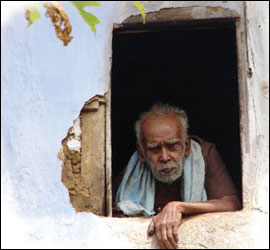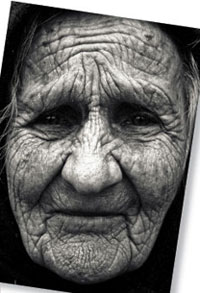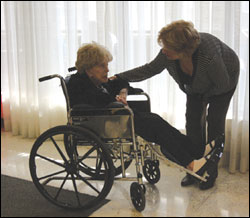|
October 1 is International Day of Older persons:
Remembering
the aged
Don't neglect and abandon them just because they are old and feeble.
Even though they are in the twilight of their lives and may no longer be
able to contribute much to the labour force of the country or lend a
helping hand around the house, they still have an abundance of love and
a wealth of wisdom to offer humanity.
 The
aged should be loved and cherished and taken good care of. They have
completed their share of duties and obligations to their families in
particular and society in general. Now it's our turn to appreciate all
they've done and reward them by making the twilight years of their lives
radiate with love, laughter and happiness. The
aged should be loved and cherished and taken good care of. They have
completed their share of duties and obligations to their families in
particular and society in general. Now it's our turn to appreciate all
they've done and reward them by making the twilight years of their lives
radiate with love, laughter and happiness.
Remember, we are all travelling on the same road; some day it'll be
you standing at the end of the cycle of life, yearning to be loved,
cherished and taken care of especially by those whom you dedicated most
of your lives to. In recognition of the need to focus attention on the
aging population of the world, a special day has been dedicated for
them.

The UN General Assembly designated October 1 the International Day of
Older Persons on December 14 1990, following up on initiatives such as
the Vienna International Plan of Action on Ageing, adopted by the 1982
World Assembly on Ageing and endorsed later that year by the General
Assembly.
In 1991 the UN General Assembly adopted the United Nations Principles
for Older Persons. In 2002 the second World Assembly on Ageing adopted
the Madrid International Plan of Action on Ageing to respond to the
opportunities and challenges of population ageing in the 21st century
and to promote the development of a society for all ages.The United
Nations' (UN) International Day of Older Persons is celebrated annually
on October 1 to recognize the contributions of older persons and to
examine issues that affect their lives.
It is a special day for older persons or senior citizens all over the
world. The World Health Organization (WHO), which is the UN's directing
and coordinating authority for health related issues, and other groups
have been actively involved in promoting public awareness and attention
on the International Day of Older Persons. Discussions are centred on
topics such as: ageing populations and the provision of adequate
healthcare for aged persons; volunteer work; social care; and ways to be
more inclusive of older persons in the workforce.
The International Day of Older Persons was observed for the first
time throughout the world on October 1, 1991.
*******
Fact file - Ageing population:
*Sri Lanka is identified as a country with the fastest ageing
population in the region of South Asia.
*Sri Lanka's senior citizen ratio will increase upto one per four
among the population within the next two decades

*Between 2005 and 2050, the old-age dependency ratio will double in
more developed regions and almost triple in less developed regions.
* The ageing of population would be somewhat gradual in the next few
years, but would gain momentum after 2011.
* A startling fact is that in the next 20 years the percentage of the
aged in Sri Lanka would double. Experts claim that the older population
in the region itself is ageing. The oldest old (80 years or older) is
the fastest growing segment of the older population. They currently make
up 13 per cent of the 60+ age group and will grow to 20 per cent by
2050. The number of centenarians (aged 100 years or older) is projected
to increase 14-fold from approximately 265,000 in 2005 to 3.7 million by
2050. The majority of older persons (55 per cent) are women. Among the
oldest old, 64 per cent are women. Striking differences exist between
regions. One out of five Europeans, but one out of 20 Africans, is 60
years or older. In some developed countries today, the proportion of
older persons is already one in four. During the first half of the 21st
century that proportion will be close to one in two in some countries.
* The current demographic revolution is predicted to continue well
into the coming centuries. Its major features include the following: One
out of every ten persons is now 60 years or above; by 2050, one out of
five will be 60 years or older; and by 2150, one out of three persons
will be 60 years or older.
******* |

